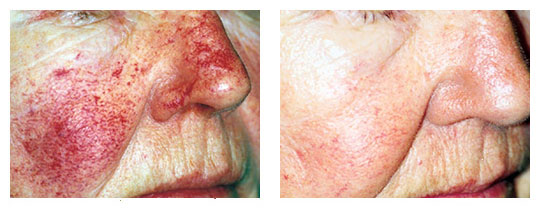What is Rosacea?
Rosacea affects millions of people worldwide, however the exact cause remains misunderstood. Rosacea is potentially contributed to an underlying vascular and/or inflammatory disorder, affecting response to thermal stimuli.
Rosacea affects mainly fair skinned individuals between the ages of 25 and 50, and is more common in women.
Various factors are believed to flare Rosacea symptoms, such as changes in temperature, sun exposure, emotional stress, consumption of alcohol and spicy food, as well as use of poor quality cosmetic products. This causes the hypersensitive facial capillaries to dilate, stimulating an inflammatory reaction and resulting in redness, burning and occasionally itching.
Stages of Rosacea
There are various stages of Rosacea, including:
- Stage 1: characterised by temporary facial flushing as a result of changes in hot and cold temperatures and various other stimuli.
- Stage 2: constant facial flushing progresses into stagnant facial redness caused by dilated and weakened facial vessels.
- Stage 3: identified by the development of papules and pustules beneath the skin.
- Stage 4: an advanced case of Rosacea, involving rhinophyma (permanent inflammation of the nose), thickening of the skin and enlarged pores.
Note
Keeping Rosacea symptoms under control involves analysing the individual factors which may flare symptoms, and minimising exposure.
This may include abstaining from certain foods/alcohol/caffeine, poor quality skin care products, and minimising sun exposure.
Effective long-term management of Rosacea symptoms involves daily home care alongside a clinical treatment plan.
Rosacea Treatments
Laser Treatments
Although there is no cure for Rosacea, we can help to successfully relieve the symptoms, including facial flushing, redness and dilated capillaries, with a course of Excel V laser treatments.
It is important to note that treatments are a not a cure, but a relief of Rosacea symptoms, and maintenance treatments may be required to keep symptoms at bay.
Home Care
At DermaCare we believe in a wholistic approach to skin health, which is why we also support a daily home care regime, offering a medical skin care and mineral make-up range, as well as a selected range of practitioner only oral supplements.
Your medical practitioner will devise an individual medical skin care prescription tailored to your skin condition and treatment goals.
There are a few steps you can follow at home to help minimise the appearance of rosacea and maintain clinical treatment results:
- Sun protection: zinc-based sun protection is important to prevent future damage to facial vessels, as well as offering anti-inflammatory benefits.
- Topical Vitamins: important for strengthening facial capillaries, improving the skin complexion and maintaining clinical treatment results.
- Anti-redness solutions: offer anti-inflammatory benefits, calming redness and burning, and improving the skin complexion.



